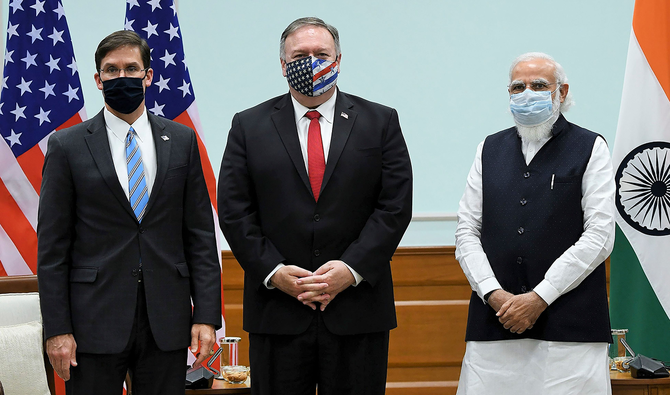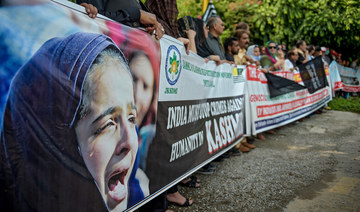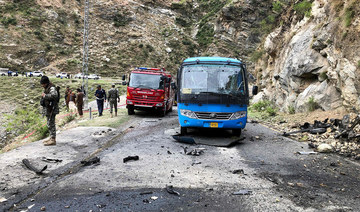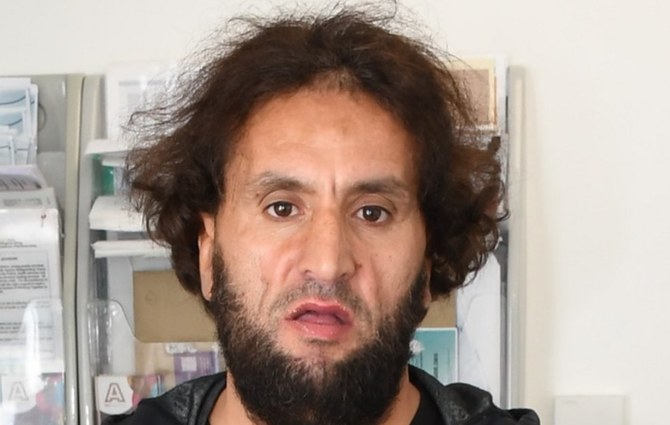NEW DELHI: India and the US signed a major new defense pact on Tuesday, in a sign of deepening bilateral ties between the two countries.
The deal will allow New Delhi to access to top-secret satellite and sensor data from Washington, an essential tool in military applications and operations.
“We held a comprehensive discussion on a range of key issues,” Indian Defence Minister Rajnath Singh said at a press conference in the capital.
He described the new Basic Exchange and Cooperation Agreement (BECA) as “a significant move,” adding that the “military-to-military cooperation” with the US was “moving forward very well.”
The minister said: “We identified projects for the joint development of defence equipment. We reaffirmed our commitment to peace and security in the Indo-Pacific region.”
The two countries signed the deal during the annual 2+2 dialogue between their defense and foreign ministers. The agreement comes amid escalating tensions and a “warlike situation” between New Delhi and Beijing along the border in the disputed Himalayan region of Ladakh.
It follows 20 Indian soldiers losing their lives during a deadly clash in the Galwan Valley of Ladakh on June 15, breaking 45 years of peace on the Indo-China border.
Reaffirming US support for India in its growing rivalry with China, Secretary of State Mike Pompeo told media on Tuesday: “The US will stand with India in its efforts to defend its sovereignty.”
US Secretary of Defence Mark Esper said that it was time to institutionalize cooperation between Washington and New Delhi.
“Our focus now must be on institutionalizing and regularizing our cooperation to meet the challenges of the day and uphold the principles of a free and open Indo-Pacific well into the future,” Esper said in the meeting with the Indian delegation.
In 2016, Washington designated New Delhi as a “major defense partner” and signed the Logistics Exchange Memorandum of Agreement (LEMOA), which allows the militaries of both the countries to share bases for strategic purposes.
Two years later in 2018, the two nations signed the COMCASA (Communications Compatibility and Security Agreement) for “interoperability between the two militaries and sale of high-end technology from the US to India.”
Singh said Tuesday’s deal was a “significant step” in the right direction.
“Signing the BECA today, after signing LEMOA in 2016 and COMCASA in 2018, is a significant achievement in the direction of bilateral defence issues and a larger regional and global perspective,” he said.
During the meetings, the US also discussed “advanced” security and cooperation between the two allies.
“This year marks the 15th anniversary of the first US-India defence framework and our third 2+2 dialogue. We have strengthened our defense and security partnership considerably since then. We advanced our regional security, military-to-military and information-sharing cooperation,” Esper said.
Experts said the BECA defence pact would “facilitate operational engagement” between the two countries.
“BECA will complete the four basic agreements that facilitate operational engagement between the armed forces of the two states,” said Pranay Kotasthane, a strategic expert at Bengaluru-based think-tank The Takshashila Institution.
He said that the agreement will not compromise India’s strategic autonomy “as some have feared.”
Kotasthane added: “The keyword here is facilitate. There is no loss of autonomy because of these agreements. India doesn’t become beholden to fighting US wars because of these agreements.”
Former Indian ambassador Anil Wadhwa said the deal breaks the past “hesitation” for data sharing between the two countries.
“It certainly strengthens close military and technical cooperation. There would be no hesitation in terms of changing data and selling equipment based on geospatial information,” Wadhwa, who served as ambassador to Italy, Poland, Oman and Thailand, told Arab News.
The 2+2 dialogue forum discusses defence and security issues between India and the US and looks at ways to enhance peace and stability across the Indo-Pacific region.
Launched in 2015, it replaced the India-US Strategic Dialogue, which was held since 2009 and focused on regional security, economic cooperation, defence, trade and climate challenges.
Underlining the importance of the new agreement, Indian Foreign Minister Subrahmanyam Jaishankar said: “Our national security convergences have obviously grown in a more multipolar world. We met today to not only advance our own interests, but to ensure that our bilateral cooperation makes a positive contribution in the world arena.”
However, the timing of the defence pact has raised questions about India’s developing competition with China.
Some experts said that at a time when New Delhi should be easing tensions with Beijing, the “open embrace” of the US would “frighten China.”
Delhi-based political analyst Prem Shankar Jha told Arab News: “The US will not come to help India fight China. The only result from this kind of deal would be greater enmity. We would lose. We are creating a situation where we are leaving China with no other alternative but to declare war on India.”
He added: “We are doing everything we can to frighten the Chinese, but this will only heighten tensions”.
However, former ambassador Wadhwa said: “If Beijing is not concerned about New Delhi’s sensitivity, why should India care?
“The Chinese have not been sensitive to our concerns. They did what they wanted to do. They have been in the Indian territory in Ladakh which they have not done before. In that situation we have no choice but to get a defense deal from whichever place available,” he added.


























